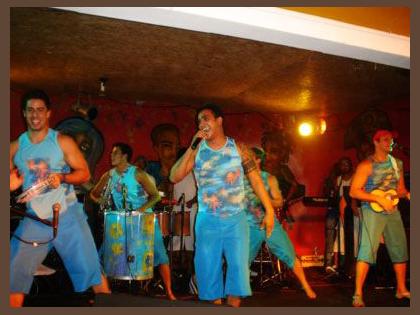 Os Sungas
Os Sungas
Os Sungas: The Rhythmic Mavericks of Brazilian Music
In the vibrant tapestry of Brazilian music, Os Sungas emerged as a band that dared to push boundaries and challenge conventions. Their infectious melodies and provocative lyrics resonated with a generation yearning for liberation and expression.
Origins and Challenges
Formed in the coastal city of Rio de Janeiro in 1984, the band initially comprised four friends: Bernardo Vilhena, Marcus Vianna, Maurício Valladares, and André Valladares. They faced numerous challenges in their early years, struggling to gain recognition and overcome censorship.
Discography and Artistic Evolution
Os Sungas released their debut album, "Faca na Caveira," in 1985. It showcased their eclectic blend of punk, rock, reggae, and funk, imbued with a distinctly Brazilian flair. Their subsequent albums, including "Domingo de Manhã" (1987), "Sunga de Bolinhas" (1989), and "Um Banho de Loucura" (1991), further cemented their status as musical innovators.
Controversies and Social Commentary
The band's lyrics often delved into controversial topics, criticizing social inequality, political corruption, and religious hypocrisy. Their album cover for "Domingo de Manhã" featured a nude woman, sparking outrage among conservative groups. However, Os Sungas never shied away from expressing their views, using their music as a platform for social commentary.
Members and Influences
Bernardo Vilhena, the band's charismatic lead singer and songwriter, possessed a unique vocal style that blended punk aggression with Brazilian bossa nova influences. Marcus Vianna and Maurício Valladares provided driving rhythms on drums and bass, respectively, while André Valladares added intricate guitar work. The band was also influenced by a diverse range of artists, from The Ramones to Gilberto Gil.
Legacy and Impact
Os Sungas disbanded in 1993, leaving an indelible mark on Brazilian music. Their legacy continues to inspire contemporary artists and their music remains a testament to their fearless artistic spirit. Their song "Domingo de Manhã" has become an iconic anthem of freedom and rebellion, echoing the band's unwavering commitment to pushing boundaries and challenging the status quo.
In the vibrant tapestry of Brazilian music, Os Sungas emerged as a band that dared to push boundaries and challenge conventions. Their infectious melodies and provocative lyrics resonated with a generation yearning for liberation and expression.
Origins and Challenges
Formed in the coastal city of Rio de Janeiro in 1984, the band initially comprised four friends: Bernardo Vilhena, Marcus Vianna, Maurício Valladares, and André Valladares. They faced numerous challenges in their early years, struggling to gain recognition and overcome censorship.
Discography and Artistic Evolution
Os Sungas released their debut album, "Faca na Caveira," in 1985. It showcased their eclectic blend of punk, rock, reggae, and funk, imbued with a distinctly Brazilian flair. Their subsequent albums, including "Domingo de Manhã" (1987), "Sunga de Bolinhas" (1989), and "Um Banho de Loucura" (1991), further cemented their status as musical innovators.
Controversies and Social Commentary
The band's lyrics often delved into controversial topics, criticizing social inequality, political corruption, and religious hypocrisy. Their album cover for "Domingo de Manhã" featured a nude woman, sparking outrage among conservative groups. However, Os Sungas never shied away from expressing their views, using their music as a platform for social commentary.
Members and Influences
Bernardo Vilhena, the band's charismatic lead singer and songwriter, possessed a unique vocal style that blended punk aggression with Brazilian bossa nova influences. Marcus Vianna and Maurício Valladares provided driving rhythms on drums and bass, respectively, while André Valladares added intricate guitar work. The band was also influenced by a diverse range of artists, from The Ramones to Gilberto Gil.
Legacy and Impact
Os Sungas disbanded in 1993, leaving an indelible mark on Brazilian music. Their legacy continues to inspire contemporary artists and their music remains a testament to their fearless artistic spirit. Their song "Domingo de Manhã" has become an iconic anthem of freedom and rebellion, echoing the band's unwavering commitment to pushing boundaries and challenging the status quo.